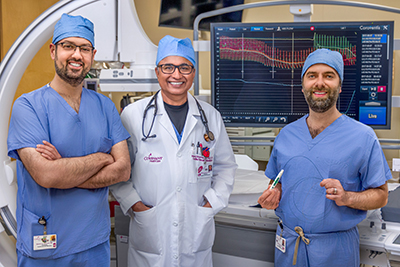Diagnosing Coronary Microvascular Dysfunction (CMD)
Diagnosing Coronary Microvascular Dysfunction (CMD) with the Coroventis‡ CoroFlow‡ Cardiovascular‡ System and Abbott’s PressureWire™ X Guidewire

Angina (chest pain) is caused by inadequate blood flow in the heart. The diagnosis and treatment of angina has traditionally focused on disease in the three major epicardial arteries, but most of the blood supply in the heart is in smaller vessels, or microvasculature, which are too small to be directly visualized. The Coroventis‡ CoroFlow‡ Cardiovascular System uses data from Abbott’s PressureWire™ X Guidewire to estimate the flow in the macro and micro vasculature of the heart, allowing physicians to precisely diagnose the cause of their patient’s angina. This diagnosis is critical in optimizing patient treatment strategies in order to improve patient outcomes and quality of life.
Warning signs of CMD may include:
- Chronic angina (chest pain)
- You’ve had a negative stress test but are still suffering from angina
- Recurrent angina after receiving stent(s) for coronary blockages
- You’ve been diagnosed with indigestion but have found no relief for your symptoms
CMD Diagnostic Procedure
The CoroFlow‡ Cardiovascular System enables analysis of how well the microvasculature is functioning using data from Abbott’s PressureWire™ X Guidewire. The test is performed in a cardiac catheterization lab in a procedure similar to receiving an angiogram of your heart. During the diagnostic procedure, a small wire is placed in the arteries in order to measure the flow of blood in the arteries of your heart. Your physician will use the data to determine whether your microvasculature is functioning properly.
CMD Treatment
CMD can be treated with medications and/or lifestyle changes to control risk factors and reduce symptoms. Having the correct diagnosis for your chest pain will allow your doctor to choose the best treatment path for you.
When To See a Doctor
If you’re having chest pain and other signs and symptoms — such as shortness of breath, sweating, nausea, dizziness, or pain that radiates beyond your chest to one or both of your arms or to your neck — seek emergency medical care. It can be hard to tell if your symptoms are due to CMD, but it is important to see your doctor to find out the cause.
To help determine whether a CMD diagnostic test may be appropriate, please contact Covenant Cardiology at 989.583.4700.